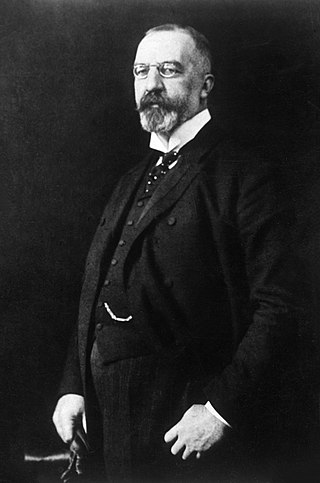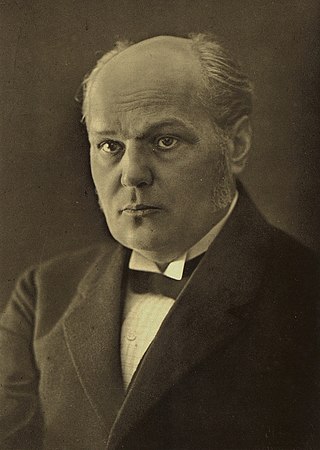A member of parliament (MP) is the representative in parliament of the people who live in their electoral district. Members of parliament typically form parliamentary groups, sometimes called caucuses, with members of the same political party. Many countries with bicameral parliaments, this term refers only to members of the lower house since upper house members often have a different title. The terms congressman and deputy are equivalent terms used in other jurisdictions.

Cisleithania, officially The Kingdoms and Lands Represented in the Imperial Council, was the northern and western part of Austria-Hungary, the Dual Monarchy created in the Compromise of 1867—as distinguished from Transleithania. This name for the region was a common, but unofficial one.

The Treaty of Saint-Germain-en-Laye was signed on 10 September 1919 by the victorious Allies of World War I on the one hand and by the Republic of German-Austria on the other. Like the Treaty of Trianon with Hungary and the Treaty of Versailles with the Weimar Republic, it contained the Covenant of the League of Nations and as a result was not ratified by the United States but was followed by the US–Austrian Peace Treaty of 1921.

The Imperial Council was the legislature of the Austrian Empire from 1861 until 1918. It was a bicameral body: the upper house was the House of Lords, and the lower house was the House of Deputies. To become law, bills had to be passed by both houses, signed by the government minister responsible, and then granted royal assent by the Emperor. After having been passed, laws were published in the Reichsgesetzblatt. In addition to the Imperial Council, the fifteen individual crown lands of Cisleithania had their own diets.

Victor Adler was an Austrian politician, a leader of the labour movement and founder of the Social Democratic Workers' Party (SDAP).

The Duchy of Bukovina was a constituent land of the Austrian Empire from 1849 and a Cisleithanian crown land of Austria-Hungary from 1867 until 1918.

The Parliament of the Czech Republic or just Parliament is the legislative branch of the Czech Republic. It meets in Malá Strana, Prague and is composed of 281 total members and Senators.

Count Richard von Belcredi was an Austrian civil servant and statesman, who served as Minister-President (and 'Minister of State') of the Austrian Empire from 1865 to 1867. During 1881–1895, Belcredi was President of the Cisleithanian Administrative Court.

Count Karl von Stürgkh was an Austrian politician and Minister-President of Cisleithania during the 1914 July Crisis that led to the outbreak of World War I. He was shot and killed by the Social Democratic politician Friedrich Adler.
The Jewish National Party was an Austrian political party of the Jewish minority.

The Federal Chancellery of Austria is the ministry led by the chancellor of Austria. Since the establishment of the First Austrian Republic in 1918, the Chancellery building has served as the venue for the sessions of the Austrian cabinet. It is located on the Ballhausplatz in the centre of Vienna, vis-à-vis the Hofburg Imperial Palace. Like Downing Street, Quai d'Orsay or – formerly – Wilhelmstrasse, the address has become a synecdoche for governmental power.

Legislative elections were held in Cisleithania, the northern and western ("Austrian") crown lands of Austria-Hungary, on 14 and 23 May 1907 to elect the members of the 11th Imperial Council. They were the first elections held under universal male suffrage, after an electoral reform abolishing tax paying requirements for voters had been adopted by the Council and was endorsed by Emperor Franz Joseph earlier in the year. However, seat allocations were based on tax revenues from the States.

Legislative elections to elect members of the Imperial Council were held in Cisleithania, the Austrian section of Austria-Hungary over several days in June and July 1911. A coalition of German national and liberal parties, the Deutscher Nationalverband, emerged as the largest bloc in Parliament, holding 100 of the 516 seats. Voter turnout was 80.2%.

The House of Lords was the upper house of the Imperial Council, the bicameral legislature of the Austrian Empire from 1861 and of the Cisleithanian (Austrian) half of Austria-Hungary upon the Compromise of 1867. Created by the February Patent issued by Emperor Franz Joseph I on 26 February 1861, it existed until the end of World War I and the dissolution of the Dual Monarchy, when on 12 November 1918 the transitional National Assembly of German-Austria declared it abolished. It was superseded by the Federal Council of the Austrian Parliament implemented by the 1920 Federal Constitutional Law.
Elections to the Cisleithanian Imperial Council were held in the Kingdom of Dalmatia in 1911 to elect the eleven Dalmatian members of the Imperial Council as part of the wider Cisleithanian elections. The eleven members were elected from single-seat constituencies by universal male suffrage.

Legislative elections to elect the members of the ninth Imperial Council were held in March 1897 in Cisleithania, the northern and western ("Austrian") crown lands of Austria-Hungary. These elections were first in Cisleithania held under the curial system with universal, but still not equal, suffrage.

Albin Dötsch was an Austro-Hungarian politician, who was a member of the Austrian Imperial Council in the early 20th century, for the Social Democratic Party of Austria.

Legislative elections to elect members of the Cisleithanian Imperial Council were held in the Czech lands over several days in June and July 1911. The Czech lands elected 194 out of the 516 seats in the Imperial Council.

Legislative elections to elect members of the Cisleithanian Imperial Council were held in the Czech lands over several days in May 1907. The Czech lands elected 194 out of the 516 seats in the Imperial Council.
This page is based on this
Wikipedia article Text is available under the
CC BY-SA 4.0 license; additional terms may apply.
Images, videos and audio are available under their respective licenses.













